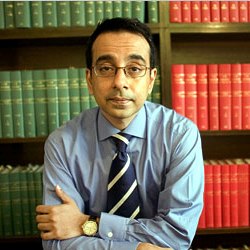
Authorities are intent on stifling calls for free elections, says Malik Imtiaz Sarwar
When compared to recent events in the Arab world, the protests in Kuala Lumpur on the 9 July this year might appear of little consequence. Official state accounts of the protests describe a lack-lustre and directionless gathering of some 6,000 persons in the heart of Kuala Lumpur. More realistic accounts however point to a gathering of more than 50,000 people and a campaign of extreme repression by the Najib administration aimed at stifling the movement underlying the protests, one calling for free and fair elections.
The movement is spearheaded by a coalition of 62 non-governmental bodies calling itself “Bersih 2.0” — “bersih” being the Malay word for “clean” and 2.0 for this being a reformed version of the original coalition which included within its ranks political parties. It kicked off its campaign for a reform of the electoral process, centered on eight demands, in October last year. After unfruitful efforts to engage the Election Commission, an institution that is widely perceived as not being independent, and the government in meaningful dialogue, the coalition announced in late June this year that it would organise a rally on 9 July to peaceably protest the lack of political will for reform.
Bersih had staged a successful demonstration in 2007 that many credit for having contributed to the shift of support from the incumbent government political coalition in the general elections of 2008. Concerned at the possible political repercussions and more so for the opposition once against throwing its weight behind the cause, the government reacted.
What it did, and how it did it, reveals the extent to which the freedom of expression, assembly and association has been undermined in Malaysia. It is also indicative of how things might evolve.
Initial efforts by the Najib administration involved posturing on the part of the government, the police and NGOs aligned with the government. Malaysians were told by the state controlled media and press that the intended rally was an illegal assembly (police permits are required for gatherings of five or more persons in public) and that the rally was counter-productive as it would be disruptive. Dialogue was invited, though with the condition that the rally was to be called off.
In the face of unwavering commitment on the part of the organisers, the rhetoric was intensified and a campaign of demonisation ensued. The organisers were now labeled as proxies for the opposition, were anti-Malay and anti-Islamic, and being intent on toppling the government. Restrictions were issued as to how the rally was to be characterised.
Government proxies began agitating and inciting racial tension with seeming impunity. The police inconsistently began arresting individuals who were promoting the rally. In one of the earliest episodes, 31 members of the Socialist Party of Malaysia, including Dr Michael Jayakumar, a Member of Parliament, were arrested for allegedly conspiring to wage war against the King. They were, it was said, involved in a plot to resurrect communism and this was provenby their having in their possession t-shirts printed with the images of pre-independence communist guerillas and socialist pamphlets. 6 them, including Dr Jayakumar, were ultimately detained without trial indefinitely. They are still being detained.
In the period that followed, the police began arresting anyone that was wearing a Berish t-shirt or anything that resembled it. The Home Minister declared Bersih 2.0 an illegal society, a decision that justified more invasive action by the police. The Bersih 2.0 secretariat was raided and seven members of its secretariat were arrested. So were opposition politicians who mentioned the upcoming rally in speeches or who otherwise promoted the event. Organisers were called in for questioning.
The chief of police upped the ante by revealing the purported discovery of hidden caches of weapons seemingly linked to the rally and declaring that some might be killed on the day of the rally.
Intervention by the king, who called for more consultation on the matter between the government and the organisers, led to the organisers agreeing to hold the rally in a stadium. The necessary permit was not forthcoming and the organisers now asked supporters to converge on a historic stadium in the middle of the city on the afternoon of 9 July. The police then obtained a court order barring 91 persons from entering specific areas of Kuala Lumpur on 9 July. The city was locked down, with roadblocks established on major arteries, barricades erected and bus permits into the city cancelled for the weekend.
The measures did not work. Some 50,000 Malaysians made it through to peaceably express their support for the cause despite brutal measures by the police. Accounts of the events of Saturday suggest that extreme force was used without reason or provocation. 1,667 persons were arrested. These were in addition to the 60 or so persons who had been arrested in the first phase of the campaign. All indications point to a significant number being charged with offences, in particular the organisers.
In the wake of the event, state controlled media and news agencies have wholly distorted the nature, success and impact of the protests to the great frustration of many. The coalition has filed a legal action to challenge the ban order and the six detained have filed habeas corpus applications. Both actions have yet to be scheduled for hearing.
An uneasy state of calm has descended for the moment, with the government and Bersih 2.0 each proclaiming that their mission was a success. That the Najib administration considers itself justified in having waged a campaign of intimidation against the citizenry is worrying. It indicates a willingness on its part to do whatever it takes to secure its political position. This has grave implications.
Malik Imtiaz Sarwar is the President of the National Human Rights Society of Malaysia and a lawyer based in Kuala Lumpur. He was the 2009 recipient of the Index on Censorship Freedom of Expression for Law and Campaigning





